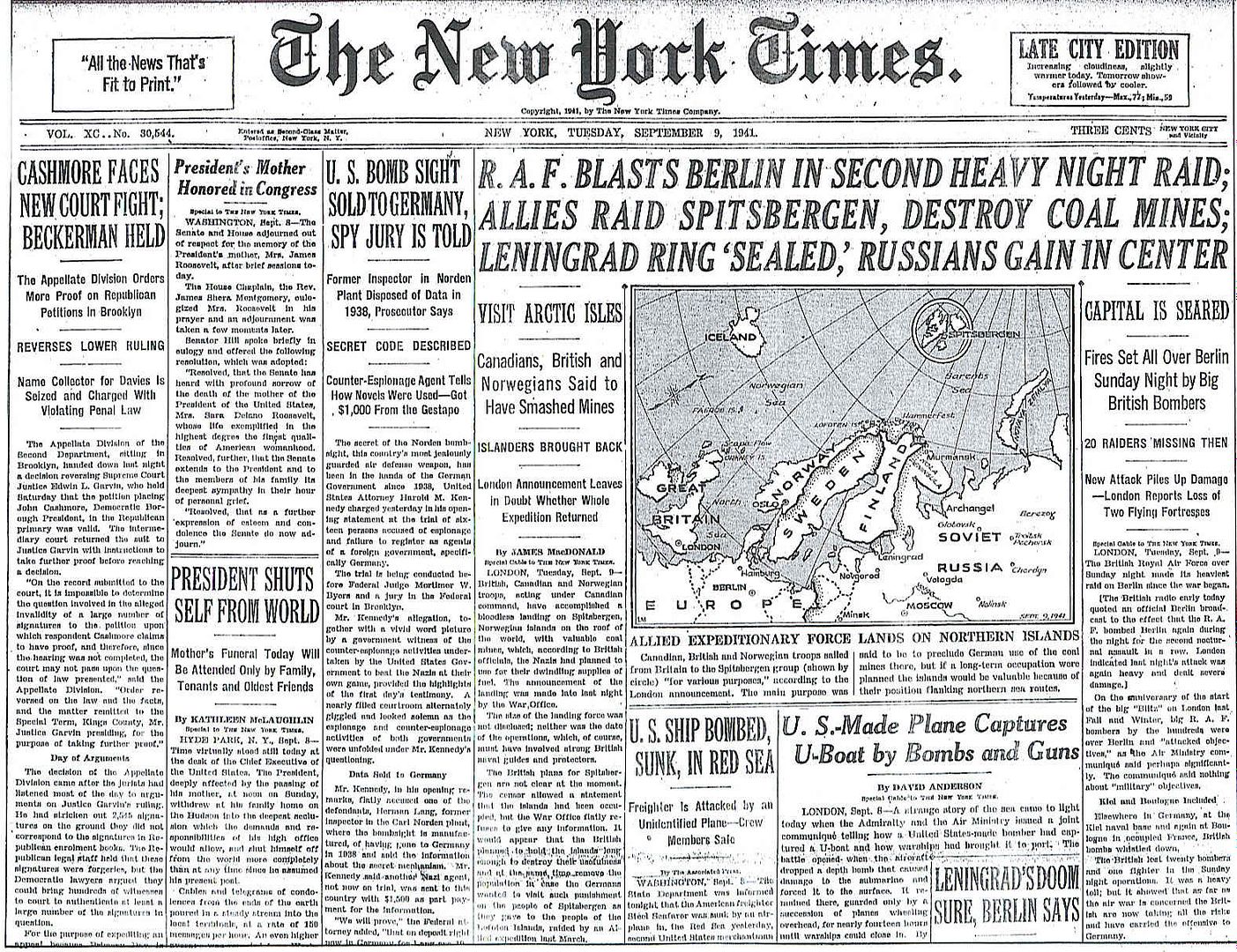
Posted on 09/09/2011 4:58:50 AM PDT by Homer_J_Simpson

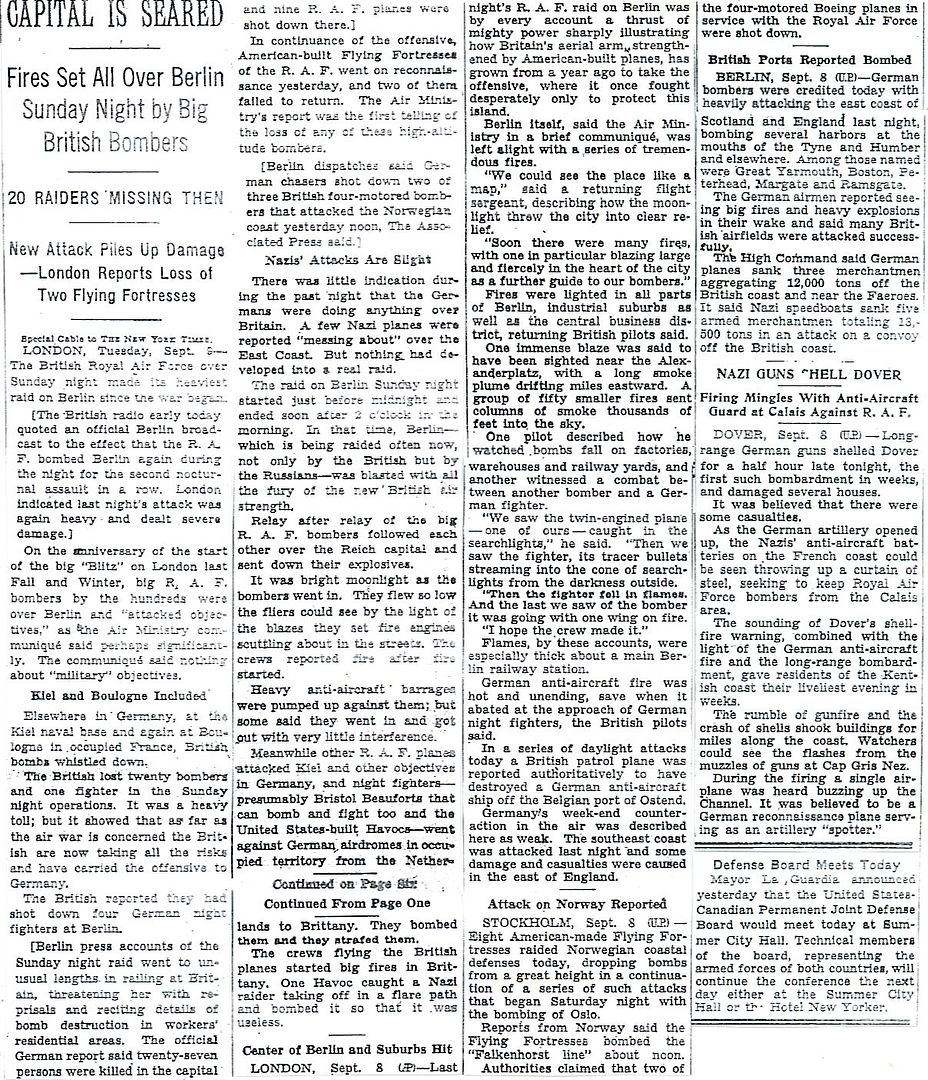
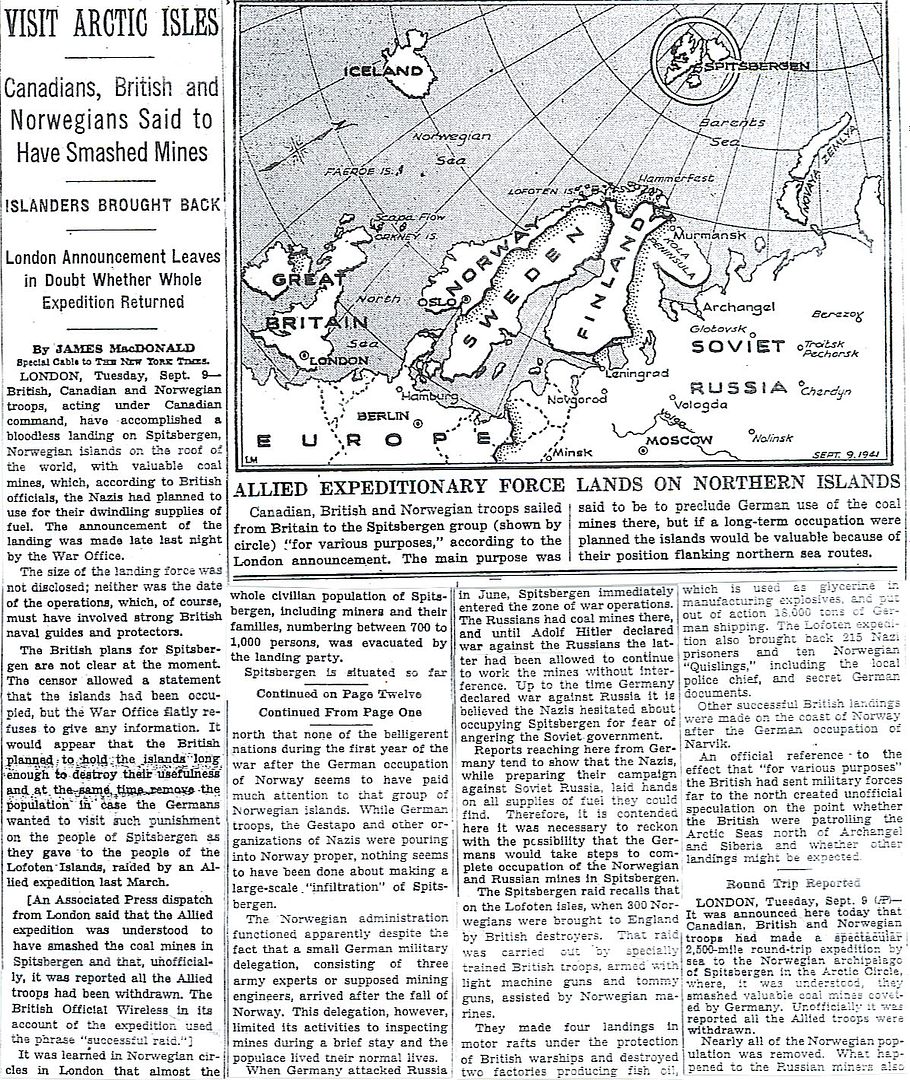
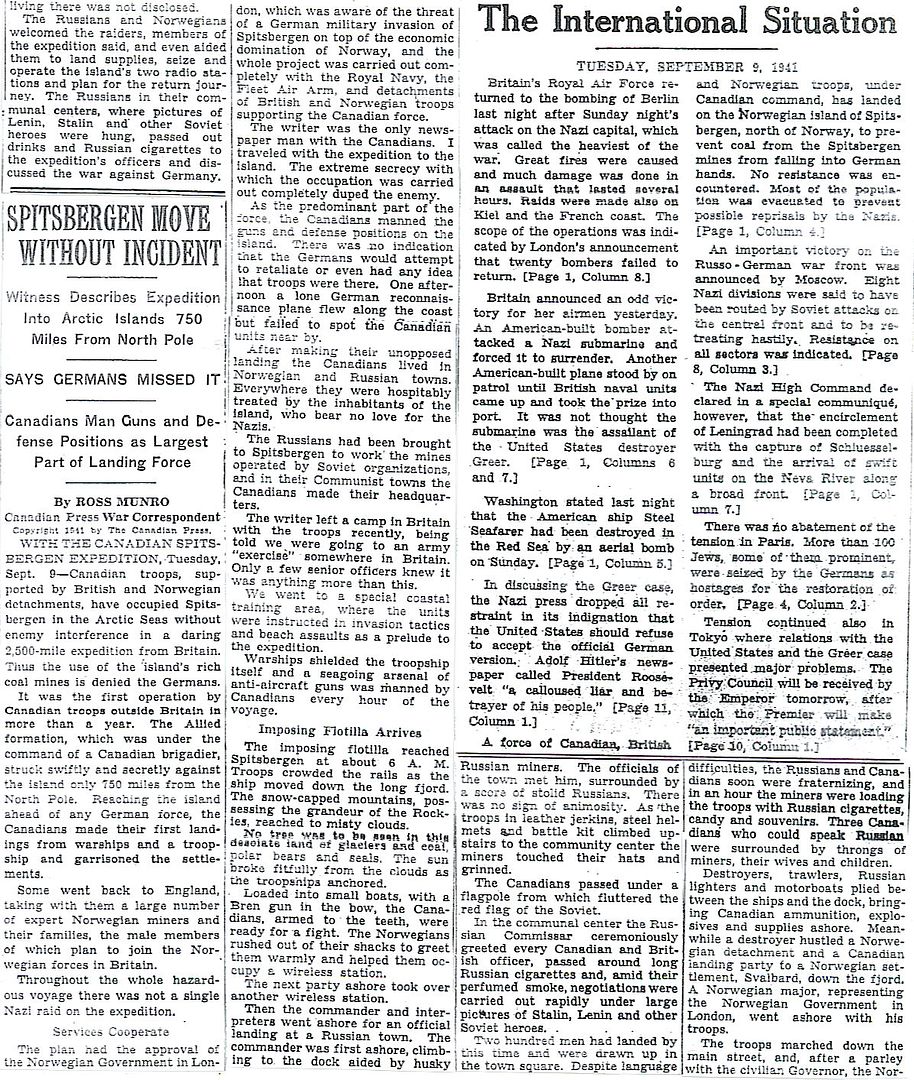
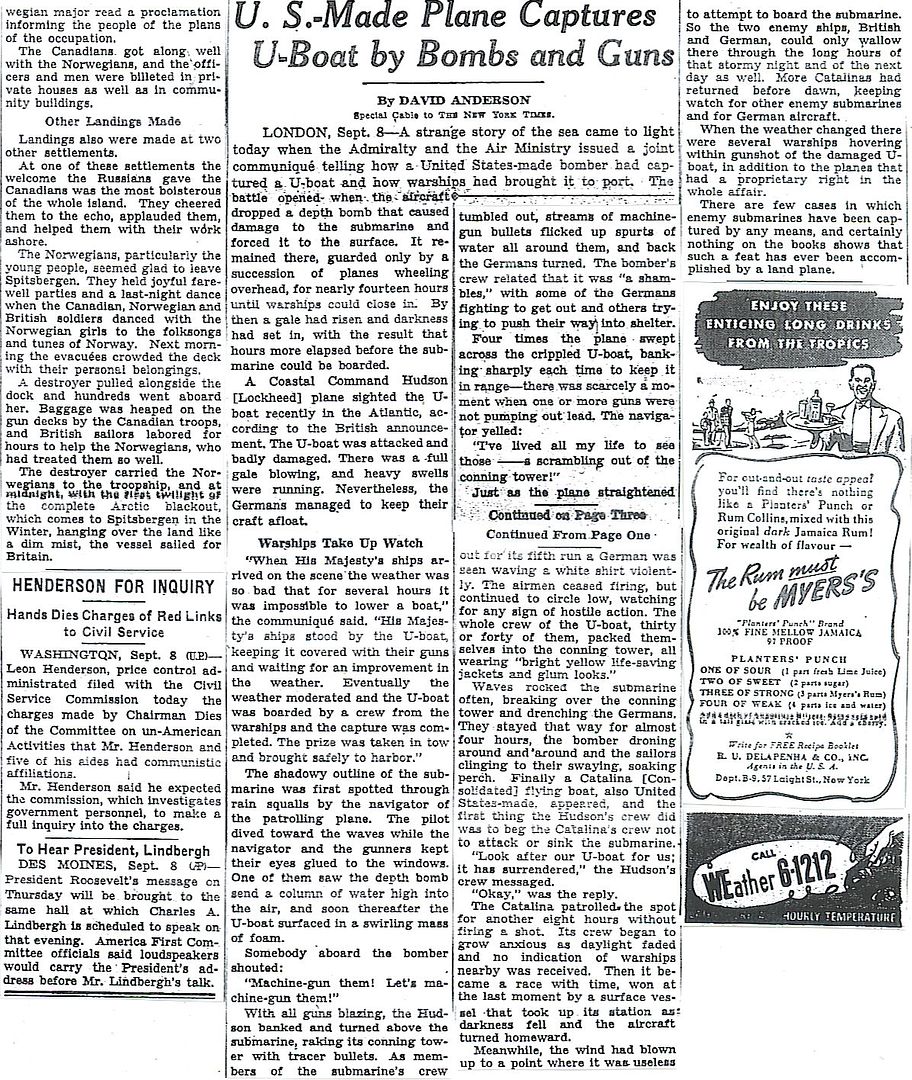
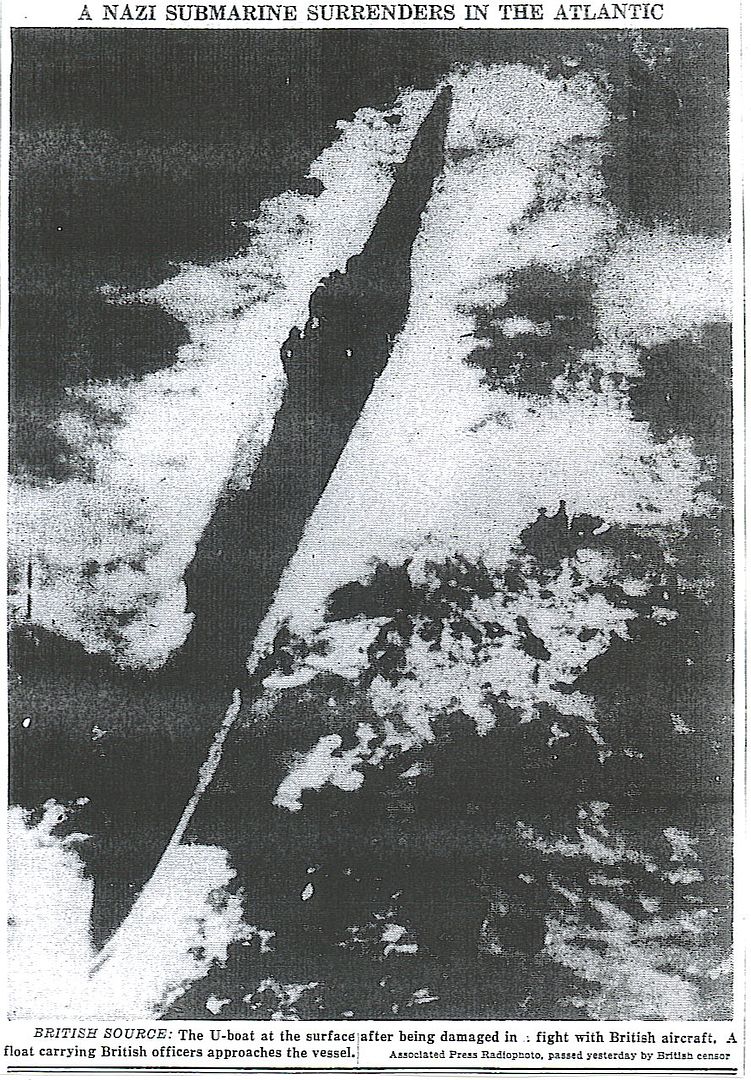
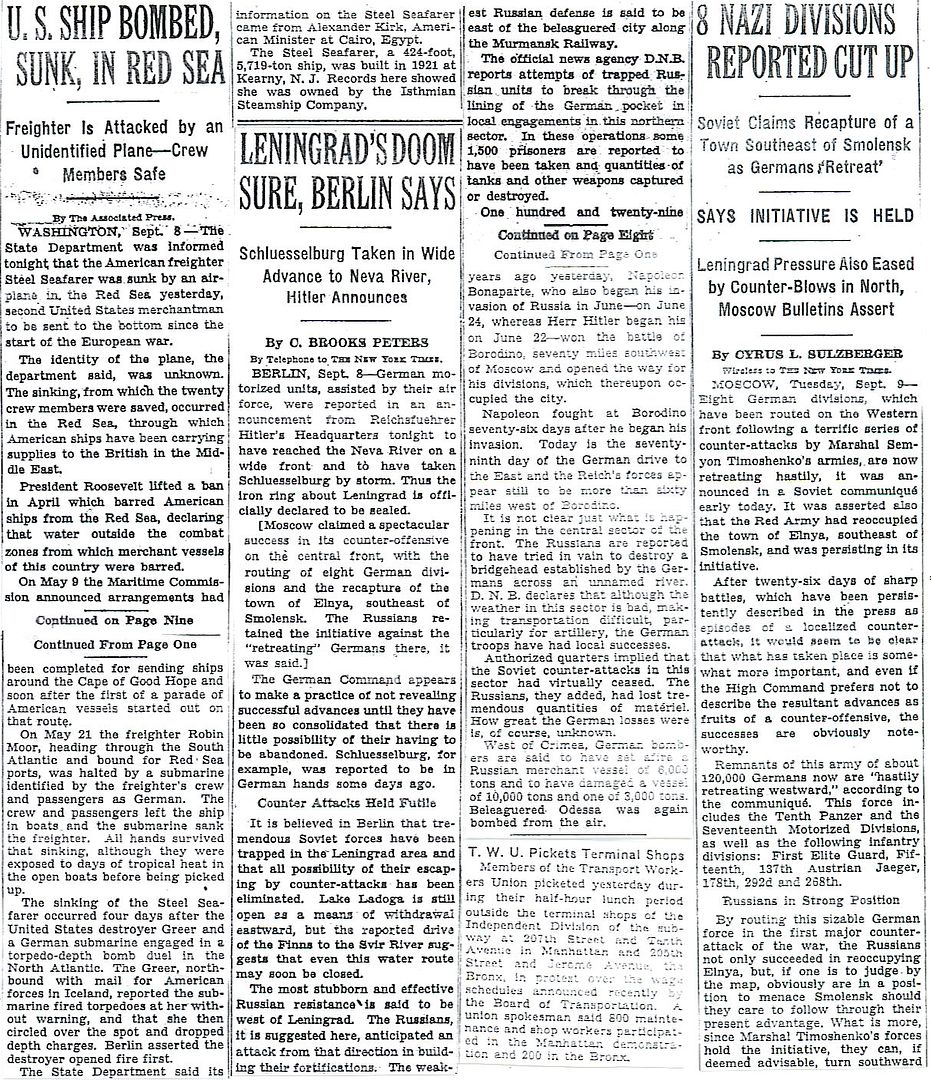
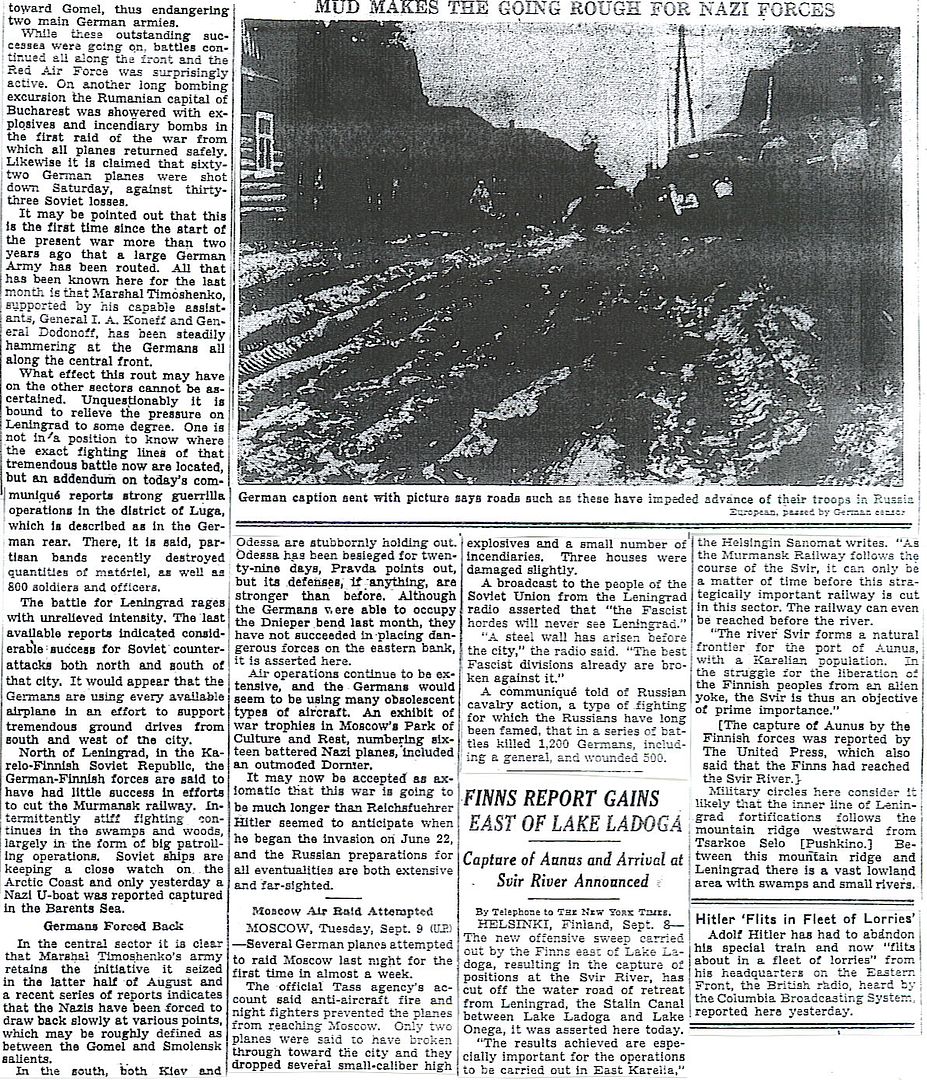
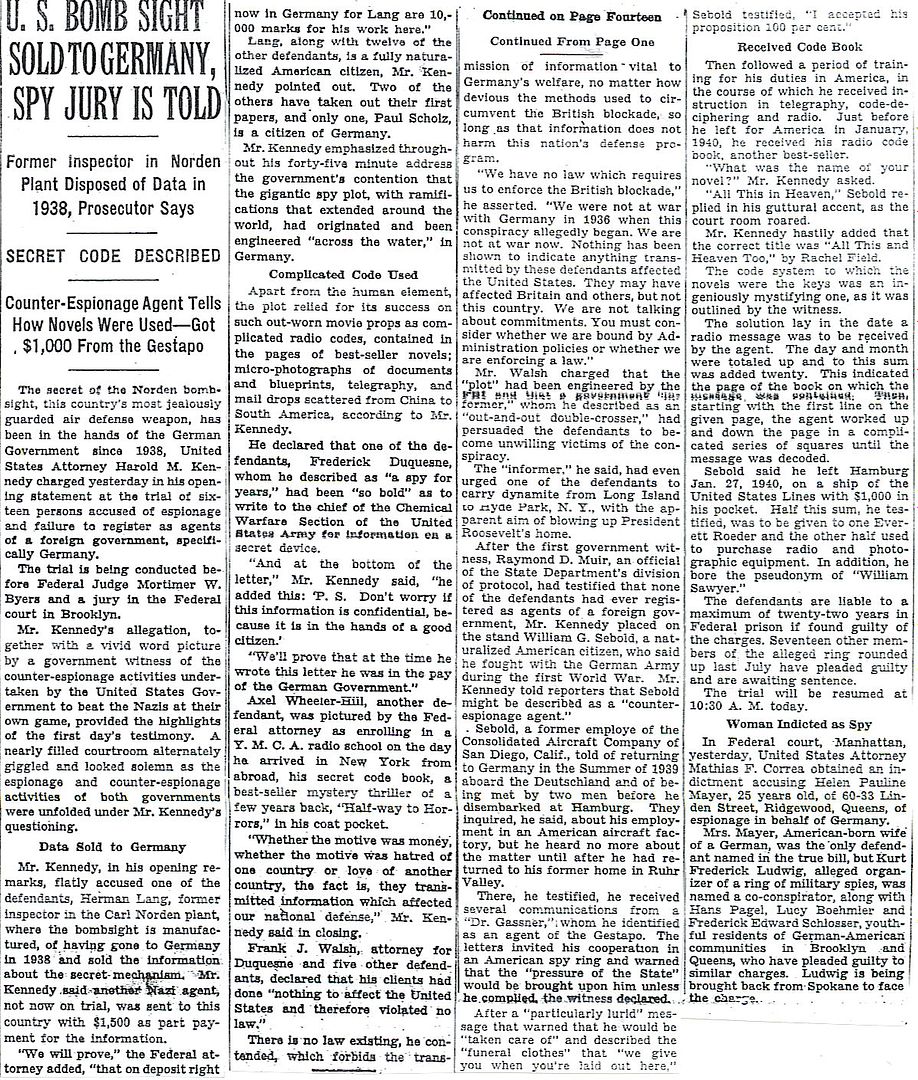
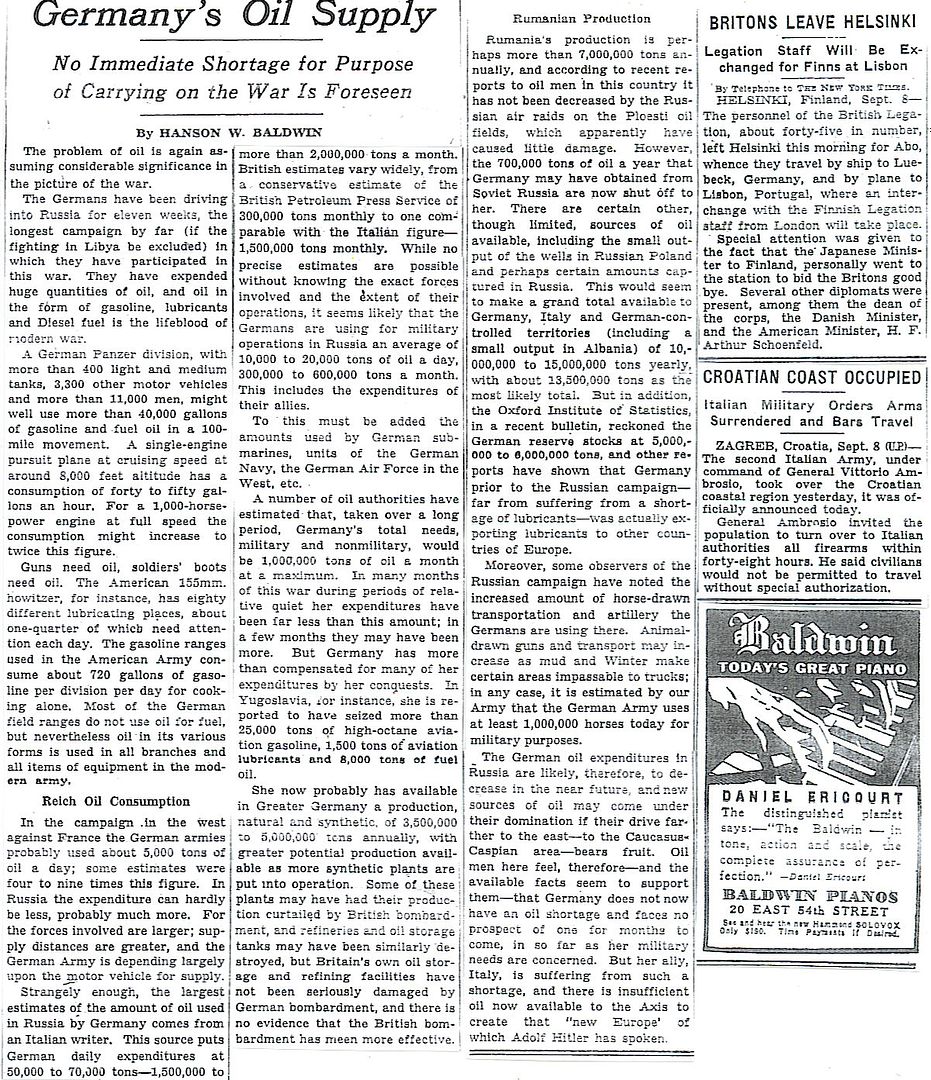
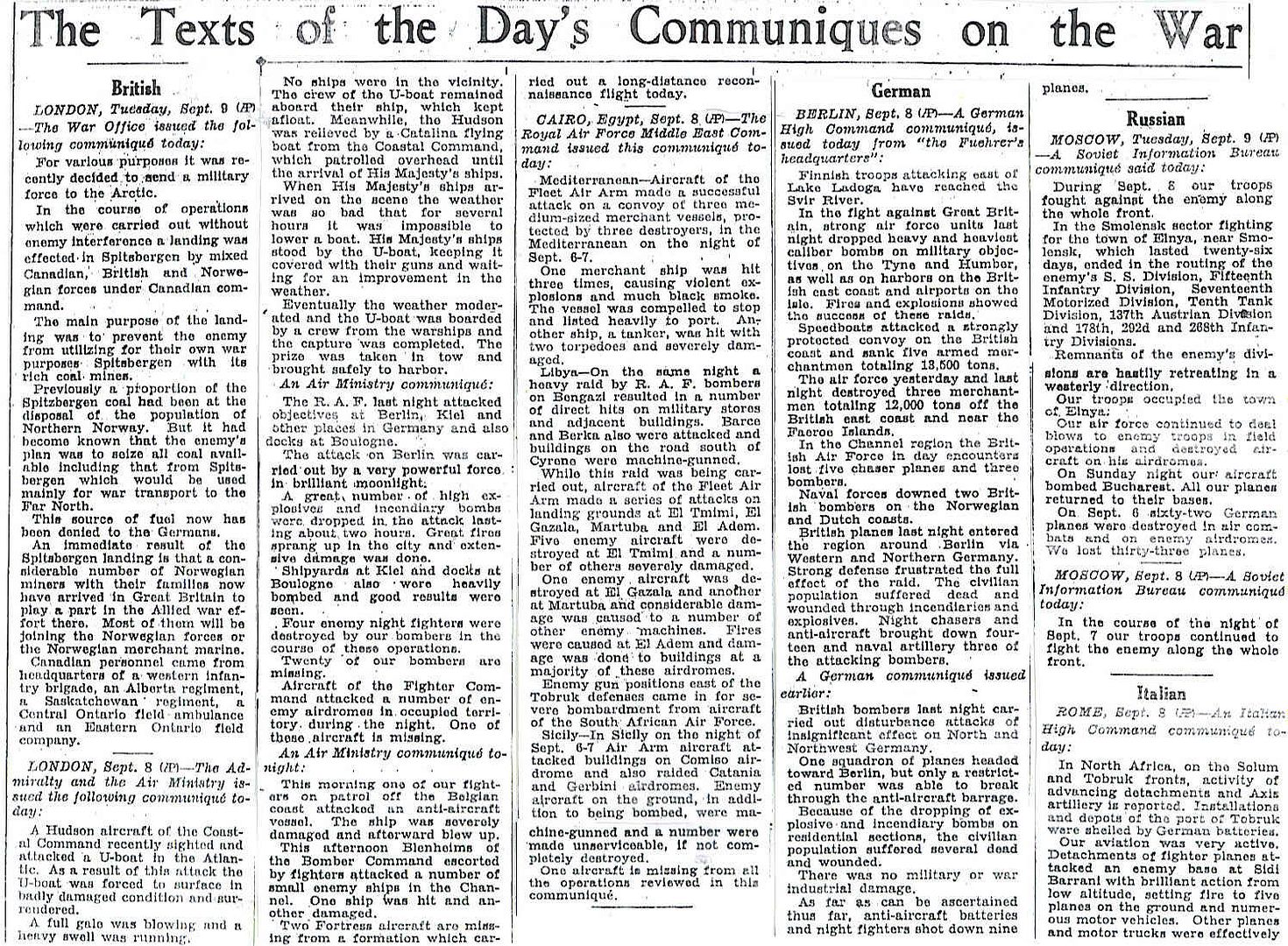
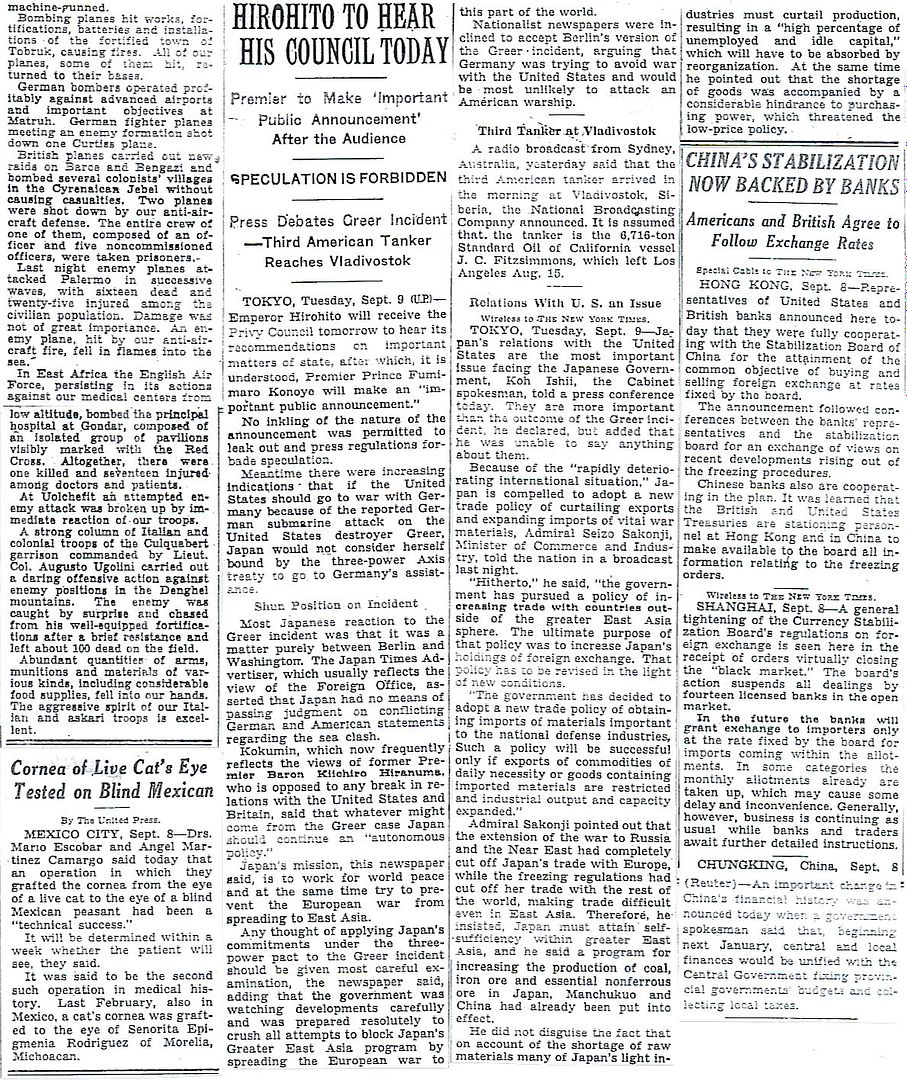
http://www.onwar.com/chrono/1941/sep41/f09sep41.htm
Spaniards fighting Bolshevism
Tuesday, September 9, 1941 www.onwar.com
On the Eastern Front... The Spanish Volunteer Division, “Blue Division” arrives to serve with the German Army on the Leningrad Front.
http://homepage.ntlworld.com/andrew.etherington/month/thismonth/09.htm
September 9th, 1941
GERMANY: The Wehrmacht is getting help from a group of allies in its assault on Russia. Mussolini has sent an expeditionary corps, the Romanian army is engaged in the drive on Odessa, the Hungarians are supporting the thrust through the Ukraine and Franco has sent a contingent of Spanish “volunteers”. The Slovaks too, have soldiers fighting for the Germans, and volunteers from Holland, Denmark, Belgium and Norway have been formed into legions of the Wehrmacht. The Finns are a disappointment to the Germans, doing no more than holding the northern line round besieged Leningrad.
U-162 is commissioned.
U-702 chief engineer killed during an accident in Kiel. The boat was undergoing trials at the time. (Dave Shirlaw)
FINLAND: The Finnish advance in Karelian Isthmus is stopped. The troops have reached the outermost defences of Leningrad and dig into defence. Three years of trench warfare follows here, until the Soviet attack in June 1944.
Meanwhile the Karelian Army advances into eastern Karelia north of Lake Ladoga. The first signs of war weariness are already showing in the men. There have been instances of men declining to follow orders to cross the pre-1939 border; the common opinion is that the war is fought to reconquer the territory lost in the Winter War, not to annex new ‘living space’ from east. However, the majority of men are content with grumbling, and the serious cases of insubordination are few.
The official explanation for crossing the old border is to get as short lines of defence as possible. Tactically this is true, but the Finnish leadership is already discussing what shape the post-war ‘Greater Finland’ shall take. The most favoured option is the so-called ‘border of three isthmuses’: Karelian Isthmus (between Gulf of Finland and Lake Ladoga), Onega Isthmus (between Lakes Ladoga and Onega) and the isthmus between Lake Onega and White Sea, of which English name I don’t have a clue (”Maaseln Kannas” is the Finnish name). The status of Kola Peninsula is still unclear; whether is will be claimed by Finland or Germany has not been decided yet.
If all this sounds preposterous, well, there were also some nutcases who thought that the Ural Mountains were Finland’s ‘natural’ eastern border.
One wonders what these people (who were very few and belonged to the lunatic ultra-right-wing fringe) would have done with the 150 million-strong Russian minority... No-one in the Finnish military or political leadership entertained this notion. (Mikko Härmeinen)
U.S.S.R.: A volunteer Spanish “Spanish Division” arrives on the Leningrad Front to begin service with German forces against the Soviet Union.
Recon elements of Generalleutnant Walter Model’s 3 Pz.Div. (XXIV Pz.K.) discovered a gap in Soviet defenses between Konotop and Baturin.
ROMANIA: Marshall Ion Antonescu fires the commander of the 4th Army, General Cuiperca. It comes after the first two rounds of bloody fighting, in which the Romanians failed to completely breach the Russian defences (backed up by prodigious quantities of artillery and mortar fire) at Odessa. Cuiperca frankly reported to Antonescu that his troops lacked the strength, both physically and in terms of morale, to successfully resume the assault. Antonescu, known for his frank speaking himself in a command culture where direct talk was often perceived as impolite and insulting, did not respond well to this analysis.
Antonescu claims that Cuiperca lacks “faith in the battle capacity of the Romanian Army.” Antonescu has brought in his own defence Minister, Iacobici, to replace Cuiperca at 4th Army - a man considered one of the great academic brains of the Romanian staff. (Michael F. Yaklich)
ARCTIC OCEAN: In the Svalbard Islands in the Norwegian Sea, British, Canadian, and Norwegian troops land on Spitsbergen Island to destroy coal mines the Germans Nazis might use for fuel. (Jack McKillop)
IRAN: Tehran: Iran expels German and Italian “tourists” and diplomats. She accepts the Anglo-Soviet armistice terms. (Jack McKillop)
COMMONWEALTH OF THE PHILIPPINES: MacArthur complains to Grunert that the training of the mobilized Philippine troops is not going well.
Marshall advises MacArthur that he had “the highest priority” for supplies and for the filling of the “authorized defence reserve” of 50,000 men. (Marc Small)
CANADA: Minesweeper HMCS Port Hope laid down Toronto, Ontario.
Corvette HMCS Dunvegan commissioned. (Dave Shirlaw)
U.S.A.: The USN’s Bureau of Aeronautics requests that the National defence Research Committee and the Naval Research Laboratory to develop an interceptor radar suitable for installation in a single-engined, single-seat fighter, e.g., the F4U Corsair. (Jack McKillop)
ATLANTIC OCEAN: U-81 sinks SS Empire Springbuck in the 65 ship Convoy SC-42. (Dave Shirlaw)
learned two things today:
Nazi’s shell dover from France:.
Norden bomb site was obtained in 1938 by germans via espionage.
Russian “roads” picture. germans didnt plan on that problem 3 months after invasion and facing winter outside moscow.
more evidence today of the problem the Japanese have in coming to a decision. ultimately they are unable to and so the default position is War, which dooms them.
The “Blue Division,” listed as the 250th Infantry Division in the Wehrmacht order of battle, will get a reputation for not retreating and also of having its way with the local ladies.
This is also a brilliant move on Franco’s part. It allows him to pay back the help he received from Hitler without becoming an active belligerent and being at war with Britain. It also allows him to get rid of some of the more virulent young fascist hotheads who want to join in Germany’s war.
For more information:
http://www.wehrmacht-awards.com/axis_allies/blue_division.htm
The Germans knew or should have known about the poor road conditions in Russia. For many officers and senior NCO’s, it’s deja vu, since they fought on the same ground 20 years ago.
Cougar can post some more information about what the German general staff knew of the logistic challenges of Barbarossa. Their generals went ahead with the operation in total disregard of a number of “logistic laws” that govern military operations. These issues will only become more exacerbated in the next few months.
As I continue to study this “war within a war” on the Eastern Front, my opinions of it are going through some revision. I once held the conventional view that the Germans came close to victory only to see it slip through their grasp. Now I consider it amazing that despite all of the challenges they faced in Barbarossa, that the Germans got as far as they did.
The spearhead of the attack was formed by motor-cyclists and armored scout cars of the " Leibstandarte Adolf Hitler."
They were followed by an advanced formation of 73rd Infantry Division. Sturmbannführer [major] Meyer, who was driving with his leading company, searched the horizon through his binoculars. Nothing—no movement anywhere.
Forward. Von Büttner's motor-cycle platoon was moving along the coast towards Adamany, from where the ground should be visible to both sides of the Tartar Ditch. Suddenly, like ghosts, a few horsemen appeared on the horizon and instantly vanished again —Soviet scouts.
Caution was needed.
"Drive in open order!"
The silence was uncanny.
The riflemen in the side-cars were poised to leap out. The riders were hanging over to the side so as to jump off their machines all the more quickly.
It was shortly after 0600 hours. The motor-cycle detachment under Gruppenführer [ lieutenant-general] Westphal was carefully approaching the first houses of Preobrazhenka.
The village lay close by the main road from Berislav to Perekop. A flock of sheep was coming out of the village.
Westphal waved his arms at the shepherd. "Get your flock off the road, man— we're in a hurry!"
But the Tartar did not seem to understand. Or perhaps he did not want to? Westphal opened his throttle till the engine screamed and drove straight into the flock. The sheep scattered wildly and scampered off in panic. The shepherd shouted and sent his dogs after them. It was no use. The sheep ran off the road. A moment later the air was rent with thunder and lightning. The sheep were being blown to smithereens. The flock had run into a minefield.
As though this inferno of explosions and the bloodcurdling bleating of dying sheep were not enough, enemy artillery suddenly opened up. Shells were bursting outside and inside the village. The motor-cyclists dismounted and advanced towards Preobrazhenka along the Perekop road. Suddenly before them they saw a whole wall of fire. On the far side of the village, only a few hundred yards in front of the German spearheads, stood a Soviet armored train: it pumped its shells and machine-gun bursts straight into Meyer's and Stiefvater's companies.
The effect was terrible.
"Take cover!" The men lay pressed to the ground.
Machine-gun fire swept over their heads. But this fire was not coming from the armored train: it was coming from Russian riflemen concealed in well-camouflaged foxholes and trenches barely 50 yards in front of the Germans.
Sturmbannführer Meyer gave the order to withdraw from Preobrazhenka. His armored scout cars opened fire at the armored train with their 2-cm. guns, to enable the rest of the unit to withdraw under cover of smoke canisters. Meanwhile a 3.7-cm. anti-tank gun of Meyer's 2nd Company was hurriedly hauled forward and started shelling the train. But no sooner had a few rounds been fired than the gun received a direct hit. Bits of steel sailed through the air, and the crash of metal drowned the screams of the men.
Meyer meanwhile dodged through the village to its far end, accompanied by his runners. From there he could see the elaborate defenses of Perekop—trenches, barbed wire, concrete pillboxes. This, he realized, was not a position to be taken by a surprise coup.
Any further attempt would mean the end of his formation.
Gruppenführer Westphal, who had gone forward with him, suddenly shouted for a medical orderly. A shell had torn one of his arms off.
Scattered right and left were the dead and wounded of his group.
"We're getting out of here," Sturmbannführer Meyer repeated. He gave the signal for retreat. His runners passed on the order. Motorcycles came roaring up from behind and about-turned. Without stopping they snatched up their wounded or killed comrades into the side-cars and raced back. The scout cars put down a smoke-screen outside Preobrazhenka, to conceal the move from the enemy. Under cover of that smoke-screen Rottenführer [Non-commissioned rank] Helmut Balke made three more trips to the front to bring back the wounded. Meyer brought the last one back. He was Untersturmführer [lieutenant] Rehrl.
A shell-splinter had torn open his back. He died in the arms of his commander.
Eleventh Army's first attempt to burst into the Crimea by a coup de main with advanced units of its LIV Corps had failed.
An hour later Lieutenant-General Bieler, commanding 73rd Infantry Division, read a signal from Meyer and Stiefvater:
"Coup against Perekop impossible. Detailed account of engagement follows."
"Panzer Meyer" and Stiefvater were right. In front of the four-mile-wide exposed Perekop approach to the Crimea a system of defenses had been established in considerable depth. Its central feature was the "Tartar Ditch," a ditch 40 to 50 feet deep built in the fifteenth century, in the Turkish era, to protect the peninsula against the mainland. Five hundred years later it was to become a gigantic obstacle and dangerous trap for armor. To bypass it was impossible.
The fortifications extended from the saline swamp of the Sea of Azov on the one side to the Black Sea on the other. The door to the Crimean Peninsula was well barred.
On 17th September, when General von Manstein assumed command of Eleventh Army at Nikolayev, the great shipbuilding centre on the Black Sea, he instantly realized that with the forces at his disposal he could not simultaneously capture the Crimea and Rostov.
One or the other objective had to be set aside. But which of the two?
Manstein did not hesitate long.
The Crimea represented a permanent danger to the deep right flank of the entire German Eastern Front, since the Soviets were able to pump ever new forces into the peninsula from the south, across the sea. Moreover, in enemy hands the Crimea was also an airbase threatening the Rumanian oilfields. For that reason Manstein decided to give preference to the capture of the Crimea. On the Rostov front he merely wanted to maintain contact with the enemy forces dislodged at Antonovka.
Manstein's was a good plan. The LIV Corps under General Hansen was first of all to force the Perekop Isthmus by frontal attack. For this difficult task Hansen was assigned the entire artillery, sappers, and anti-aircraft units under Army control. In addition to his own two infantry divisions—the 73rd and the 46th—the 50th Infantry Division, a little farther to the rear, was likewise put under his command. It was a considerable striking force to tackle a defensive front only four miles wide.
Manstein, of course, was a sufficiently experienced commander to realize that with these forces he might be able to force the door to the Crimea, but not to conquer an area of 10,000 square miles, a territory nearly as large as Belgium, with its many powerful fortresses and strongpoints.
As a strategist with a regular General Staff background he therefore based the second phase of his operational plan on precision and luck. General Kübler's XLIX Mountain Corps and the SS Brigade " Leibstandarte Adolf Hitler " under Obergruppenführer [general] Dietrich were to be detached from the mainland front in the Dnieper bend the moment the break-through was accomplished and brought down in forced marches in order to advance, fan out, and occupy the whole of the Crimea.
The " Leibstandarte," magnificently equipped as it was with heavy weapons, self-propelled anti-aircraft guns, self-propelled assault guns, motor-cycles, armored scout cars, and infantry carriers, stood a good chance of overtaking the retreating enemy and cutting him off from Sevastopol. It might then take this important coastal fortress in the south of the Crimea by a swift blow, before it was reinforced.
The Mountain Corps was to be employed in the Yayla mountains, which were up to 4800 ft. high; it was then to seize the Kerch Peninsula and from there, eventually, drive across the narrow space of water into the Kuban and on to the Caucasus.
This plan was not just a mirage. Manstein regarded it as realizable—provided always the enemy did not mount any surprise actions in the Nogay Steppe.
That was the risky aspect of Eleventh Army's operations. In order to concentrate his forces sufficiently for the capture of the Crimea, Manstein had to reduce his mainland forces to a minimum by detaching the " Leibstandarte " and the XLIX Mountain Corps.
General von Salmuth's XXX Corps, to which the 72nd and 22nd Infantry Divisions belonged, had to hold on its own the front in the Nogay Steppe, supported only by the Rumanian Third Army.
Manstein took this calculated risk because he had confidence in his combat-hardened divisions.
Next: The Conquest of the Crimea
i agree with you on the view of the war within the war. if your ead first hand accounts on the german side, within a couple weeks of invasion the officers close to the battle knew they had blundered. the going in intel was woefully short on russian strength. right away, the germs encounterd 3x the number of divisions they expected.
as for the roads, not sure they fought in that area in first war. i dont think the germans got anywhere near moscow in 1917, but correct me on that
i agree with you on the view of the war within the war. if you read first hand accounts on the german side, within a couple weeks of invasion the officers close to the battle knew they had blundered. the going in intel was woefully short on russian strength. right away, the germs encounterd 3x the number of divisions they expected.
as for the roads, not sure they fought in that area in first war. i dont think the germans got anywhere near moscow in 1917, but correct me on that
After the German victory at Gorlitz-Tarnow in 1915, the Russians surrendered all of Poland, Lithuania, and about half of Latvia. The front more or less stabilized about 100 miles west of where the front was as of the writing of these articles. But it was apparent in WW1 that the road and rail networks of Poland and Russia were nowhere near as dense or sophisticated as what one would find in Western Europe. Given that the Germans had an “Untermensch” philosophy toward their Slavic neighbors, they couldn’t have expected much improvement in the 20 years leading up to WW2.
And given the road and rail networks the Germans actually found in 1941 west of the Dnepr River, they could not have expected that they would get any better the farther east they went.
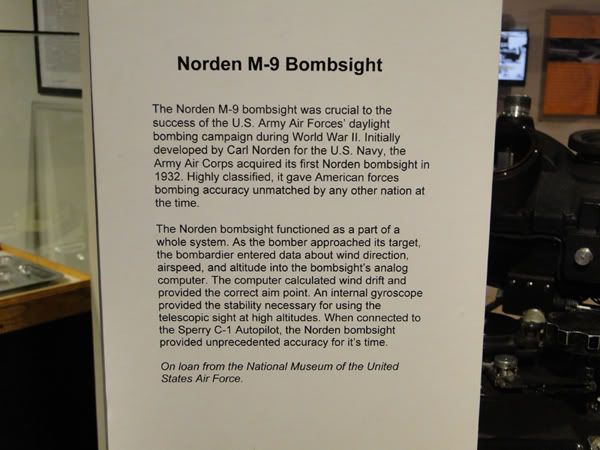
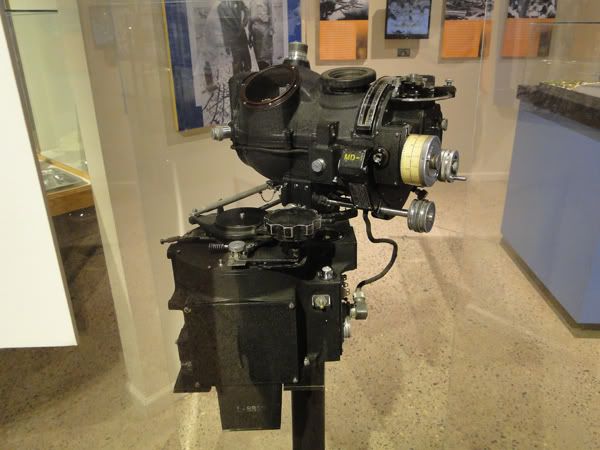
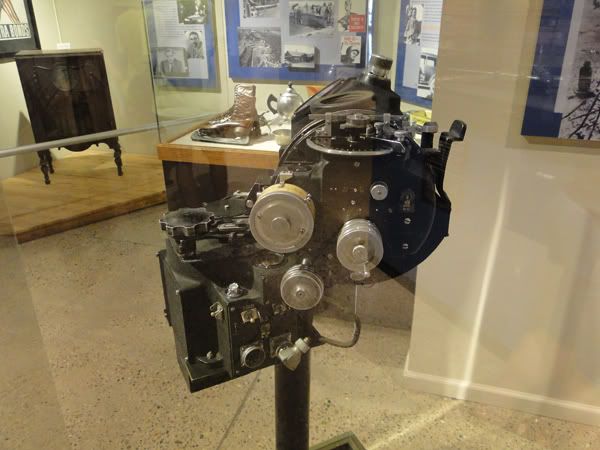
interesting. thanks
The General Staff knew full well very early on what kind of trouble they were in with the Russian terrain. Here are just a few examples of reports they received from field commanders an personnel:
"After brief downpours of rain, they [the roads] turned into muddy tracks which were only passable in some places after engineers or off-loaded grenadiers had felled trees to make a wooden runway with the trunks. It was not so much our opponents that held up our advance as the catastrophic roads." - Hans von Luck, 7th Panzer Division"All routes marked as roads turned out to be unsealed, unmaintained sand tracks. The difficulties are placing great demands on the divisions." - Panzer Group 3 War Diary
"The advance goes very slowly. Numerous obstacles keep slowing down our charge. you can't really call what we're on a road. It's better than this in the tiniest hamlet inn Germany. And we're marching on a main road! The shoulders of the road are all muddy from the previous rain - you sink up to your knees- but in the middle of the road there's dust already...each vehicle [is] surrounded by an impenetrable cloud of dust." - Wilhelm Prüller, NCO in German motorized regiment
"The compression of the troops [onto narrow avenues of advance] makes forward progress slower than we would like, to this must be added the unbelievable roads which increase the difficulties." - General Gotthard Heinrici
Keeping a modern army of this size spread across this land area supplied was a near impossible task anyway. The road conditions made it all the more difficult.
Did the Germans ever expoit their acquisition of the Norden bomb sight? I read somewhere that the Norderns were removed from the B-25s that went on the Doolittle raid to avoid allowing the Japanese to recover one from a downed plane. (Begs the question - will you only use them when you are bombing friendly territory?) Also, the plan for the Doolittle raid called for low-level bombing runs, so they didn’t need the sophisticated technology. I take it the Americans assumed the Japanese hadn’t gotten the Norden technology as a present from their Aryan allies.
As to the German's acquisition of the Norden bomb sight. I decided that since I really didn't feel like reading about the Boxer War this evening I would look at this a little further. Using some of the same resources in which I've found those interesting tidbits on the Abwehr's failure in Ireland, I found some interesting stuff on the failures in this coup of intelligence as well.
I had always thought it strange that when you do a general search on the German acquisition of the Norden technology they refer to Carl Zeiss' Lotfernrohr 7. If you look at the Lotfernrohr 7 it doesn't even bear a slight resemblence to the Norden.

So sure, this doesn't mean that the internals are not the same as the Norden, but the configuration makes it very unlikely that it is at least a total reproduction of the American design.
Now we do have our case against Herman Lang which is a legitimate case of espionage and did achieve a moderate success, but I'll get to that in a moment.
Allow me to give you some more background on the William Sebold mentioned in the article. Sebold, a naturalized American citizen, was recruited by the Abwehr while on a trip to visit his relatives in Europe in the Summer of 1939. The Abwehr threatened harm to his family unless he cooperated. Unknown to the Abwehr, he took this information to the American consulate in Cologne where he began his career as a double agent for the Americans.
Sebold would prove to be disastrous for the Germans as he would make contact with and turn over to the FBI several German spy rings in the United States. First among these were two German organizations, one in New York headed by Frederick J. Dunquesne (Also in article), and then another in New Jersey under Carl Reuper, a German automobile mechanic. He also managed to trap a number of couriers on American ships and finally he tipped off the FBI to both the agents working on the Norden bombsight and those infiltrated in the Sperry gyroscope plants.
In the case of the Norden agents (Everett Roeder was also arrested for his involvement), it was determined that while they had acquired some of the technology in their efforts to steal the plans for the Norden bombsight, "they were hardly of sufficient quantity or quality to warrant the efforts expended on their procurement." (United States v. Herman Lang et al., Manuscript Transcript of Record, District Attorney's Office, U. S. District Court for the Eastern District of New York, Brooklyn)
The Germans’ flirtation with strategic bombing died with Walter Wever. Between Udet’s fixation with putting dive brakes on anything and everything, Hitler’s desire for masses of aircraft ASAP, and the reality that the Luftwaffe was going to be, basically, a tactical, ground support air force, the brass decided that the the Norden had no practical apllication for what they were doing.
Disclaimer: Opinions posted on Free Republic are those of the individual posters and do not necessarily represent the opinion of Free Republic or its management. All materials posted herein are protected by copyright law and the exemption for fair use of copyrighted works.